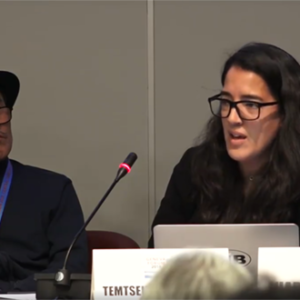DHARAMSALA, India (AP) — Buffeted by persistent cyberattacks, Tibetan monks are giving new meaning to their ancient creed: Detach from attachments. “Attachment can lead you to all sort of trouble and we Buddhists believe that non-attachment alone can lead you to happiness,” 30-year-old monk Jamyang Palden told The Associated Press at a cafe in the...
Author: Tibet Action Institute (Tibet Action Institute)
Hacker-Hit Tibetan Monks ‘Detach From Attachments’
Buffeted by persistent cyber-attacks, Tibetan monks are giving new meaning to their ancient creed: Detach from attachments.”Attachment can lead you to all sort of trouble and we Buddhists believe that non-attachment alone can lead you to happiness,” 30-year-old monk Jamyang Palden told The Associated Press at a cafe in the Indian hill town of Dharamsala,...
Chinese hackers target human rights groups, Citizen Lab says
All 10 groups compromised during 4-year study period The Canadian Cyber Incident Response Centre’s report said the “apparent objective” of the hacking is the theft of intellectual property and trade secrets. (iStock) Buffetted by persistent cyberattacks, Tibetan monks are giving new meaning to their ancient creed: Detach from attachments. “Attachment can lead you to all sort...
We Stand With You: A Statement of Solidarity with Hong Kong Protesters from a Tibetan, Uyghur, Southern Mongolian and Chinese
October 3, 2014 As a Tibetan, Uyghur, Southern Mongolian and Chinese – people who have all suffered from the oppressive policies of the Chinese Communist Party – we express our deep admiration for and solidarity with the movement for democracy and rights in Hong Kong. We have all dedicated our lives to restoring rights and...
ཞི་བའི་གདོང་ལེན་པ་བཞི་ལ་རྗེམ་སུ་ ལོ་སོན་གཟེངས་རྟགས་(James Lawson Award)ཐོབ་པ།
ནེ་ཐན་ སི་ཁ་ནིས་རྡར་( Nathan Schneider)གྱིས་བྲིས། ཁ་སང་རྒྱལ་སྤྱིའི་འཚེ་མེད་ཞི་བའི་རྩོད་རྙོག་ལྟེ་གནས་ཁང་(International Center on Nonviolent Conflict)གིས་། ཐེངས་དང་པོའི་རྗེམ་སུ་ལོ་སོན་གཟེངས་རྟགས་དེ་འཚེ་མེད་ཞི་བའི་ཡར་རྒྱས་ཆེད་གནང་འདུག མཛད་སྒོ་དེ་ནི་། (FSI) ཟེར་བའི་བདུན་གཅིག་རིང་གི་འཚེ་མེད་ཞི་བའི་རྩོད་རྙོག་ཐད་ཀྱི་ཟབ་སྦྱོང་དང་བསྟུན་ནས། རྒྱལ་སྤྱིའི་འཚེ་མེད་ཞི་བའི་རྩོད་རྙོག་ལྟེ་གནས་ཁང་གི་ལོ་འཁོར་མཇུག་སྡོམ་བརྒྱུད་། (Tufts)གཙུག་ལག་སློབ་ཁང་གི་ལས་འགུལ་སྣ་མང་སྤེལ་སའི་ཚོགས་ཁང་ཞིག་ཏུ་ཉིན་གུང་གསོལ་ཚིགས་སྐབས་སུ་འཚོགས་གནང་འདུག རྗེམ་སུ་ལོ་སོན་གཟེངས་རྟགས་འཐོབ་མཁན་བུད་མེད་བཞི་བྱུང་འདུག་ཅིང་། ཁོང་ཚོ་ཚང་མ་བདུན་གཅིག་རིང་གི་བགྲོ་གླེང་དང་ཟབ་སྦྱོང་དེར་མཉམ་ཞུགས་གནང་འདུག གཟེངས་རྟགས་བཞེས་མཁན་བུད་མེད་བཞི་ནི། མེ་རེས་ ཁིན་( Mary King)དང་རྒ་རྡ་ ཞ་རྦེན་སྒྲར།(Ghada Shahbender) བཀྲས་མཐོང་ལྷག་སྒྲོན། ན་རྡ་ ཨལ་བ་རྡེས་(Nada Alwadi) བཅས་རེད་།
James Lawson Award Honors Four Resisters
Nathan Schneider June 23, 2011 Yesterday the International Center on Nonviolent Conflict presented its first James Lawson Award for Nonviolent Achievement—or, rather, awards. The ceremony took place over lunch in a multi-purpose room at Tufts University, midway through ICNC’s annual, week-long Fletcher Summer Institute for the Advanced Study of Nonviolent Conflict. All four Lawson Award...
Pillars of Power: How Ordinary People Can Bring Down a Government
October 23, 2014 How have regular people, again and again throughout history, overcome brutal authoritarian or colonial governments using only nonviolent weapons? One of the most fundamental concepts behind how nonviolent action works is that every government – even the most dictatorial – relies on institutions and groups in society to provide them with the...
ཇི་ལྟར་སྲིད་གཞུང་གནས་ཐུབ་ཀྱི་ཡོད་དམ། (གཞོགས་འདེགས་ཀ་བ་རྣམས)
ཞི་བའི་ཐབས་རྩོད་ནང་གི་ལྟ་གྲུབ་གནས་འགག་ཆེ་ཤོས་གཅིག་ནི། སྲིད་གཞུང་གང་འདྲ་ཞིག་ཡིན་ཡང་དེའི་དབང་ཆ་ནི་སྤྱི་ཚོགས་ཀྱི་སྒྲིག་འཛུགས་དང་ཚོ་ཁག་དག་གི་ཀ་བ་མང་པོ་ལ་བརྟེན་ཡོད་ཅིང་། སྲིད་གཞུང་གི་ཉིན་རེའི་འཛིན་སྐྱོང་ནི་དབང་ཆའི་ཀ་བ་དེ་དག་གིས་ལག་བསྟར་བྱེད་ཀྱི་ཡོད། ཀ་བ་འདི་དག་གིས་སྲིད་གཞུང་ནས་རྒྱབ་སྐྱོར་ཕྱིར་འཐེན་བྱེད་མ་ཐག་སྲིད་གཞུང་གནས་མི་ཐུབ། བོད་དོན་ལས་འགུལ་བལྟི་གནས་ཁང་གི་ལས་འགུལ་བ་བསྟན་རྡོར་གྱིས་ལྟ་གྲུབ་འདི་འགྲེལ་བཤད་རྒྱག་པ་འདི་ལ་གསན་རོགས།







